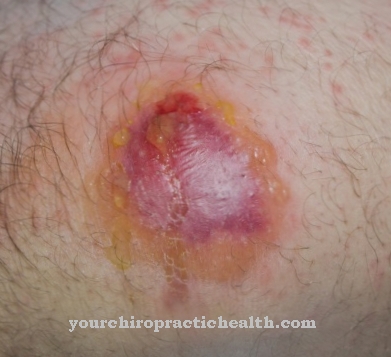Molar tooth pain are caused by poor dental care and diseases in the oral cavity and teeth.When the pain needs to be clarified by a doctor and what the doctor can do with individual complaints.
What is molar toothache?

Molar pain is repeated or one-off pain stimuli in the area of the molars. The symptoms usually occur in connection with tooth decay or an inflammation in the mouth. Affected patients experience the pain as throbbing or pressing.
The doctor can make the diagnosis on the basis of a dental examination and counteract it with medication or surgery. Good oral and dental hygiene can prevent molar pain.
causes
Molar tooth pain can have different causes. The causes are often diseases of the teeth themselves or the gums. The roots of the teeth and other areas in the oral cavity can also cause pain if there are diseases, defects or disorders.
If tooth decay is not treated in time or not treated at all, it can lead to tooth root inflammation. Persistent, pulsating pain in the area of the molars suggests a tooth root inflammation as the cause. The inflammation can spread to the jawbone and should therefore be treated. Exposed tooth necks can also be the cause.
If cold or hot food is then consumed, stabbing molar pain occurs. Damaged dental restorations also lead to pain. Here, too, the complaints express themselves when eating and drinking as well as in drafts. Inflammation of the gums is a typical trigger. If the gums are red or swollen, this can be suspected as the cause. Finally, a tooth fracture can also be the cause. The tooth breaks and different types of toothache occur.
You can find your medication here
➔ Toothache medicationDiseases with this symptom
- Caries
- Root inflammation
- Tooth fracture
- Jaw cysts
- Inflammation of the gums
- Periodontal disease
Complications
As the infection spreads to neighboring tissue, the sinuses or even veins at the base of the brain can become inflamed, causing serious conditions such as sinusitis or cavernous sinus thrombosis. In addition, the infection can spread to the tongue and cause an abscess in the floor of the mouth. This can lead to swelling and thus blockage of the airways. Oral floor abscesses and cavernous sinus thrombosis are life-threatening conditions that require immediate treatment.
When should you go to the doctor?
If the toothache persists despite careful care, a visit to the doctor is recommended. Severe complaints that are accompanied by symptoms such as inflammation or bleeding should be clarified quickly. The same applies if there are jaw or headaches, fever or facial pain.
In addition, a doctor should be consulted if there is any swelling on the teeth or gums. Repeated, seemingly unfounded pain requires a doctor's visit. If the pain gets worse over time and lasts longer and longer, the problem may be a chronic condition. If you have cheek pain as a result of a tooth injury, it is best to go to the nearest dentist immediately.
Atypical toothache, which manifests itself in the entire jaw area and possibly radiates into the chest or abdominal area, can indicate a heart attack and must be clarified immediately. If you have eye or toothache, the ophthalmologist is the right contact. Normal molar pain will be clarified by a dentist. Depending on the cause, the doctor may call in an orthodontist if necessary.
Doctors & therapists in your area
diagnosis
A visit to a doctor is recommended for molar pain. The dentist will first inquire about the symptoms as part of the doctor-patient conversation, such as where exactly and since when they have occurred. Based on the medical record, he will examine other diseases of the teeth and jaw as the cause. This is followed by an inspection of the oral cavity, the gums and the molars to identify defects, bleeding or inflammation.
To do this, the dentist uses a mirror and an examination probe. The probe is used to inspect teeth, tooth margins and fillings. In addition, it examines the nature of the tooth enamel and whether there are deposits. The vitality test is carried out with a cool substance. If a clear diagnosis cannot be made, an X-ray will be taken. The x-ray provides information about carious areas, inflammation and abscesses in the area of the molars and jawbones as well as defective fillings.
If periodontitis is suspected, the tooth pockets are examined and measured using a so-called periodontal probe. If necessary, a secretion sample is taken from a tooth pocket and sent to the laboratory for further investigations. Depending on the diagnosis, the patient can be treated on site or referred to a specialist such as an orthodontist or internist.
Treatment & Therapy
The treatment of molar tooth pain always depends on the causal disease and its severity. An incipient tooth decay that does not yet cause pain symptoms can often be treated with special fluoride pastes. In individual cases, laser treatment is also possible. In the case of more advanced symptoms, the affected area must be drilled out and filled.
In the case of periodontitis, the doctor first removes plaque from the oral cavity and gum pockets with suitable instruments. In addition, he recommends good oral hygiene to the patient and can suggest appointments for professional teeth cleaning if necessary. Medicines such as antibiotics may be prescribed. Deep gingival pockets may need to be surgically removed. The same applies to growths, abscesses and major diseases of the jaw.
An abscess is emptied with a scalpel and the wound is fixed with a suture. For molar pain, different medications are prescribed depending on the cause. For moderate pain, over-the-counter preparations such as ibuprofen or paracetamol are recommended. Severe pain is relieved with local anesthetics. Disorders such as abscesses or pericoronitis require antibiotic therapy.
Pericoronitis is also treated by rinsing the mouth. The patient has to rinse their mouth three to four times a day with the antiseptic chlorhexidine. Molar tooth pain in children, such as can occur when teething, is treated with gentle pain relievers. Alternatively, you can use brine biscuits or benzoin gel.
Cavernous sinus thrombosis or Ludovici angina must be treated immediately in the hospital. There the infected tooth is removed and an antibiotic is given to the patient.
Outlook & forecast
Molar tooth pain that occurs as a result of periodontal disease is relieved by taking pain relievers. The accompanying dental treatment removes the trigger and thereby also the symptoms. In the case of tooth decay, the prognosis is also positive, provided the disease has not progressed too far.
Early treatment can often save the teeth. If only white or brownish spots can be seen, fluoride intake is often sufficient. The substance promotes the remineralization of the tooth and prevents the spread of caries. If the bacteria have already penetrated the tooth enamel or dentin area, the affected area of the tooth must be removed.
In the case of severe caries, teeth may have to be extracted or crowns inserted. The tooth can be restored with a composite filling or a ceramic inlay. Cheek pain caused by teething usually goes away on its own after a few weeks. The pain peaks quickly and has no long-term effects on the child's health.
The prognosis is less positive in the case of thromboses or an abscess of the floor of the mouth, which are fatal. In either case, the patient needs immediate treatment. In the case of an abscess of the floor of the mouth, the patient can suffocate, thrombosis of the cavernous sinus can lead to a stroke and consequently to the death of the patient.
You can find your medication here
➔ Toothache medicationprevention
Toothache can be prevented through consistent and thorough dental care. Teeth should be brushed at least two to three times a day, ideally with a dental toothbrush, floss and mouthwash. Proper nutrition supports prevention. Foods that contain a lot of sugar, starch or acid should be avoided as they damage the tooth enamel.
Apples and lettuce are natural tooth cleaners that remove residue from teeth and interdental spaces. Smokers should consider giving up smoking. Regular medical checks are also important. The doctor can identify any illnesses and damage at an early stage and give tips for optimal oral hygiene.
In addition, it will remove tartar and can prevent damage through professional teeth cleaning. In the event of bleeding gums or signs of tooth decay, it is best to consult the dentist immediately. Cheek pain can also be prevented by protecting sensitive teeth from cold, heat and other stimuli. In the long term, it is advisable to have crowns inserted to remove the painful stimuli.
You can do that yourself
Different measures can be taken depending on the cause of the molar pain. First and foremost, the consumption of alcohol, nicotine or caffeine must be reduced or stopped entirely. Cold or hot drinks should also be avoided.
First of all, it helps to cool the affected area. The cold reduces the pain stimuli and thus provides rapid relief from the symptoms. Cloves are a tried and tested household product. The clove, similar to clove oil or sage, has a locally numbing effect.
Pregnant women should discuss the use of the home remedies mentioned with their family doctor beforehand, as side effects can occur. Toothache at night is relieved by taking it easy. To do this, the head is raised so that the affected area is adequately supplied with blood. If the measures are ineffective, it is best to consult a doctor. Molar tooth pain is often caused by a serious illness that must be clarified by a doctor.
Various homeopathic preparations can also be used for molar tooth pain. The globules Arnica in the potency D12, Hypericum in the potency D12 and Chamomilla in the potency D12 have proven themselves. These preparations help with sensitive teeth that are associated with swelling or bleeding. In addition, remedies such as St. John's wort or various teas can be used. The medicinal plant sage can be used in the form of teas or ointments.
Cooling or warming pads are also possible, whereby the cause of the molar pain must be taken into account. It is best to consult your family doctor about this. The doctor can name other measures that can effectively support the treatment of molar tooth pain. If molar tooth pain occurs repeatedly, lifestyle habits as well as cleaning habits must be viewed critically.
A balanced diet as well as the renouncement of luxury foods makes sense in any case. This not only prevents toothache, but also many other health problems.




.jpg)







.jpg)



.jpg)










.jpg)
